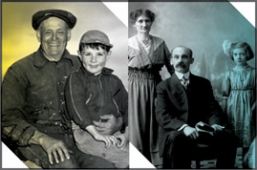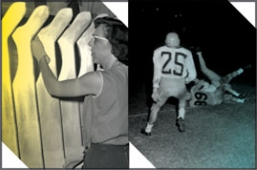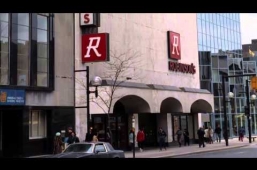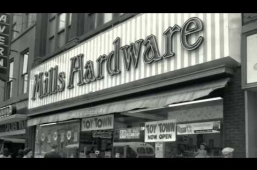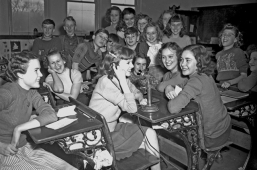From Tuesday, March 3, to Wednesday, March 4, filming will take place from 7am to 11pm at 1464 Centre Road. This may impact traffic flow in the surrounding area.
The Terryberry branch parking lot elevator is out of order. The branch is still accessible via the ramp to the Mohawk doors and then the elevator in the middle of the building. We're working to get it fixed quickly.
The accessibility door at Carlisle Branch is not working. We aim to fix it quickly.
Renovation preparations are underway in anticipation of the March 2 start. Computer availability may be limited. Living Room and Makerspace areas are closed. (The next nearest Makerspaces are Sherwood and Terryberry Branches). Renovations are expected to wrap up by late Spring. Thank you for your patience.
Renovation preparations are underway in anticipation of the March 2 start. Starting the week of February 23, the 2nd Floor will be closed. The Children's collection will be temporarily available on the 1st Floor. Renovations are expected to wrap up by late Spring. Thank you for your patience.
Starting Tuesday, February 10, the First Floor Living Room will be unavailable due to renovation preparations. Study and work spaces are available on Floors 2-3.
Please note the Noon Hour Concert on Friday, February 13, will be held at Terryberry Branch instead.
Thank you for your patience.
Please note the following Bookmobile visit updates.
Thursday, February 19
Rockton (10:30am-11:30am) - Cancelled
Bennetto 5-5:30pm (instead of 4-5:30pm)
Wednesday, February 25
Swansea 10:00-10:30am - Cancelled
Helen Detwiler 11:00am-12:00pm - Cancelled
Warplane Museum 3:00-4:00pm - Cancelled
Friday, February 27
Winona 11:00am-12:00pm - Cancelled
Maplewood 2:30-4:00pm - Cancelled
The accessible washroom at Carlisle Branch is not working. We aim to get it fixed quickly.
Effective Sunday, February 1, Sunday service hours at Central Library will be paused.
Sunday Hours will continue at Dundas, Red Hill, Terryberry, Turner Park, Valley Park and Waterdown Branches from 1-5pm.
Pringle Family: Finding Aid
The Pringle Papers
Presented to The Hamilton Public Library by Mr. Frank D. Pringle
Calendar prepared in the Reference Department by Mary Farmer, 1970
James Dunbar Pringle 1820-1882 came to Hamilton about 1850 from Cornwall, Ontario, where he had practised law with his elder brother Jacob Farrand Pringle. He bought a stone cottage at 26 Hannah street, now Charlton avenue east, from Adam Brown, and lived here until his death. His son, Robert Anderson Pringle 1856-1942, a lawyer and insurance agent, occupied the same house from 1892 until 1934.
When J. D. Pringle bought the property it consisted of a well-built stone cottage with a lot on the west side where fruit trees and vegetables flourished. The cottage was enlarged about 1870 when an upper storey was built, and in 1908 a veranda was added on the east side. In 1961 the house was torn down to provide parking space for St. Joseph's hospital.
Robert Anderson Pringle and his wife Mary Bedell had two children- Frank Dunbar 1890- and Marjorie 1891-1938. Frank was educated at Hamilton public schools and Queen's University, Kingston, and was for many years in the Engineer's Department of the City of Hamilton. Marjorie, gifted with a charming personality and beautiful singing voice, was trained for light opera in New York and Italy; she married Harold H. Shotwell in 1921 and died in Greenswood, Mississippi on January 25, 1938, leaving two young children, Billy and Audry Shotwell. Mr. Shotwell died in Detroit in 1941.
Marjorie's musical career is traced in detail in a scrapbook made by her mother which may be found elsewhere in this Library.
Mr. J. D. Pringle and his son, Robert Anderson Pringle, were active and faithful members of the Anglican Church of the Ascension, Forest avenue and John street south, in Hamilton. Financial statements, minutes and reports of vestry meetings of the church from 1875 to 1910 are among these papers, as well as numerous programs of Sunday services attended by Mr. R. A. Pringle and his family for nearly fifty years, from 1901 to 1950.
Mr. and Mrs. R. A. Pringle patronized many concerts and recitals given by amateur musical societies as well as special efforts of church choirs of various religious denominations. They were at exercises and recitals by the pupils of well-known Hamilton teachers - Mr. Aldous, Miss Ambrose, Mr. Alexander, and Mrs. Sidney Dunn, and also attended numerous public concerts in Association Hall, Mechanics' Hall, and even one in Mr. Littlehale's house in 1881 in aid of the Girls' Home.
Band concerts in the Drill Hall of the James street Armouries appear to have been enjoyed by Mr. and Mrs. Pringle from some time before 1881. Mr. Frank Pringle says that he spent many an evening in the gods at the Grand Opera House for .25 and went regularly to the band concerts in the Drill Hall as a very young lad.
From 1889 until 1914 Association Hall was on the top floor of the old Young Men's Christian association building at the south-east corner of Jackson and James streets. Mechanics' Hall, which flourished from 1853 until 1882, was on the west side of James street north near Merrick, where the north part of Eaton's store is now.
Besides their many musical and church activities, Mr. and Mrs. R. A. Pringle were both great theatre-goers, and the collection of programs which they have preserved is probably unique. They attended vaudeville at the Savoy and Temple theatres; light comedy at Summers' mountain theatre, and above all, plays and concerts at the Grand Opera House. Here they saw such well-known artists as deWolf Hopper, Mme. Nazimova, George Grossmith, Mme. Albani, James Whitcomb Riley, Marie Tempest, Alice Shaw the whistling prima donna, Sir Johnston Forbes-Robertson, Robert Mantell, and other noted stage personalities from 1880 until 1913. The Grand was torn down in 1961.
Bennett's vaudeville, later the Temple theatre, stood at the southeast corner of Catharine and King streets between Main and King, behind the Terminal station. The building was dismantled as a theatre in 1926, and as Wentworth Motors was pulled down in 1951. The Savoy theatre was for many years a burlesque and vaudeville playhouse on the north side of Merrick street opposite the market. It was razed in 1956.
In the early years of the twentieth century Summers' Mountain Theatre at the head of Upper Wentworth street on the east side of the Wentworth street incline railway, provided some of Hamilton's most popular entertainment. From 1902 until 1914, when it was destroyed by fire the theatre was owned and managed by Mr. and Mrs. George Summers who usually took leading parts in the plays presented. Summers' theatre was open from the 24th of May until after Labour Day, the Wentworth street incline railway bringing crowds of people up from the city every evening to enjoy the cool mountain breezes as well as the best in entertainment.
Mr. and Mrs. Summers' greatest success was probably "Rip van Winkle" in which they played over seven hundred times. Unfortunately, no program of "Rip van Winkle" is included in this collection.
Association Hall, the Mechanics' Institute, Bennett's and the Savoy, the Crystal palace, and the Grand Opera House have all vanished. Only the Church of the Ascension, the Drill Hall and the Cricket grounds are still standing in 1970, much as they were in Mr. and Mrs. Pringle's day.
Two interesting items in Unit 9, Railway and steamboat timetables, are the souvenir program of the opening of the Canadian Pacific Railway on June 28, 1886, and the pass given to Mr. J. D. Pringle admitting him to the Great Western Railway station platform on September 18, 1860, when Edward, Prince of Wales arrived in Hamilton. Being anxious to see the Prince and his entourage as they past his house in Hannah Street on their way to and from "Arkledun" Mr. Pringle had a raised platform built in a corner of his garden so that he could see the Prince over the top of the board fence.
On September 16, 1890, Mr. R. A. Pringle was evidently among those present at the opening of the Public Library, as he secured a copy of the program of that event. Opened by the Earl and Countess of Aberdeen, the building stood on the north side of Main street a little to the west of James, until 1955, when it was torn for parking space.
Adam Brown, postmaster of Hamilton from 1892 until 1921, was one of the city's most colourful citizens during his long life of almost one hundred years. Among other activities, he helped to bring the Great Western Railway to Hamilton; he made the arrangements for the visit of the Prince of Wales in 1860; he was a director of several companies including the Canada Life Assurance company; he represented Hamilton in the Dominion Parliament from 1887 to 1881; and was an active worker in the formation of societies for protection of children and animals. He was a member of the Church of the Ascension from its inception in 1850 until his death.
After this calendar had been set up and the pages all numbered, another box of papers from Mr. Pringle turned up.
Rather then re-number the pages, the additional entries have been added as a-b-c etc and this paging occurs throughout the calendar.
MHF
October 1970
Pringle Family: Finding Aid
a. Family papers 1 - 52
b. Correspondence 53 - 66
c. Marjorie Pringle 67 - 87
d. Correspondence
e. Contracts and agreements 88 - 97
f. Voice Training and recital expenses 98 - 141
g. Recital programs and press notices 143 - 163a
h. Photographs 163-b163-c
a. Archibald Alexander and his pupils 164 - 175
b. Madge Murphy 176 - 185
c. Jeannette Lewis 186 - 187
d. R.T. Steele's pupils 188 - 191
3. Musical Societies (Programs)
a. Hamilton choral society 192 - 265
b. Hamilton conservatory of music 266 - 313d
c. Elgar choir 314a - 384
d. Harris orchestral club 385 - 458
e. Hamilton philharmonic society 459 - 471
f. Hamilton symphony orchestra 472 - 495
g. Hamilton festival choir 496 - 525
h. Hamilton orchestral club 526 - 533
i. Women's morning musical club 534 - 543
j. Hamilton choir 544 - 565b
4. Church meetings and programs
a. Church of England in Canada
i. Order of coronation services 566 – 572j
ii. Diocese of Niagara
iii. Missionary programs 573 - 585
iv. Church programs:
v. Church of the Ascension 586 - 732-b
vi. Christ's church cathedral 733 - 769
vii.Church of St. Thomas 770 - 781
b. Methodist church
i. Central 782 - 785
ii. Centenary 786 - 819-c
iii. Elm Street 820 - 822
iv. First 823 - 827
v. Wesley 828 - 831
c. Presbyterian church
i. Central 832 - 860
ii. Knox 861 - 880
iii. MacNab Street 881 - 900
iv. St. Paul's 901 - 908
d. Miscellaneous
i. Unity church 909
5. School exercises and programs
a. Alexandra school 910 - 912-c
b. Highfield 913 - 916
c. Kingsthorpe 917 - 922
d. Hamilton music school 923 - 928-a
e. Hamilton college of music 928-b - 929
f. Miss E.S. Ambrose's pupils 930 - 936
g. R.T. Steele's pupils 937 - 941- a
h. Hamilton art school 941-b - 941-o
a. Association hall 942a - 1035
b. Cricket grounds 1036-a - 1050
c. Crystal palace 1051 - 1059
d. Drill hall 1060 - 1248
e. Mechanics' hall 1249 - 1269
f. Miscellaneous 1270 - 1302
7. Theatre programs
a. Bennett's theatre 1303 - 1420
b. Grand opera house 1421 - 3380
c. Savoy theatre 3381 - 3425
d. Summers' stock company 3426 - 2515
e. Temple theatre 3516 - 3831
8. Dundas programs 3832 - 3859
9. Railway and steamboat schedules
a. Canadian Pacific 3860 - 3872
b. Great Western 3873 -
c. Hamilton steamboat company 3874 - 3883
d. Richelieu and Ontario navigation co. 3884 - 3891
10. Sports and games 3892 - 3962
11. Miscellaneous events 3963 - 4007
12. Advertisements 4008 - 4023
13. Adam Brown (1826-1926) 4024 - 4066











